In today’s digital age, a strong online presence is a necessity. This is especially true for businesses that operate in the B2B (business-to-business) space. But simply having a website isn’t enough. You need to be visible to the companies you’re trying to reach, and that’s where B2B SEO comes in.
This guide can help you explain what B2B SEO is, why it matters for your B2B business, and how you can develop a winning strategy to achieve your goals.
What is B2B SEO?
B2B SEO stands for Business-to-Business Search Engine Optimization. It’s the process of optimizing your website and online presence to rank higher in search engine results pages (SERPs) for queries relevant to the companies you want to do business with.
Here’s the key difference: Unlike B2C SEO (business-to-consumer), which focuses on attracting individual consumers, B2B SEO caters to decision-makers within other businesses looking for solutions to specific problems.
Think of it this way: When a company needs a new marketing automation platform, they won’t search for “marketing software” (search volume 2.4K with high competition) – they’ll likely use a more specific long-tail keyword like “b2b marketing automation software” (search volume 140). B2B SEO helps your website rank high for those targeted searches, putting you in front of potential clients actively looking for what you offer.
Why is B2B SEO Important for Your Business?
Investing in B2B SEO offers a multitude of benefits for your business, impacting every aspect of your sales funnel:
- Increased Website Traffic: By ranking higher for relevant keywords, you attract more qualified leads to your website, increasing brand awareness and potential sales opportunities.
- Generate Leads and Sales: B2B SEO focuses on targeting the right audience with informative content. This helps convert website visitors into qualified leads who are more likely to become paying customers.
- Build Brand Awareness and Thought Leadership: Consistent creation of high-quality B2B content establishes your company as an expert in your industry, building trust and credibility with potential clients.
- Establish Yourself as a Trusted Resource: Ranking high in search results signifies authority and trustworthiness. This can be a key differentiator in the B2B world, where building trust is crucial.
- Nurture Leads and Improve Sales Cycle: B2B SEO allows you to create content that addresses different stages of the buyer’s journey, educating and nurturing leads throughout the sales cycle.
In short, B2B SEO is a powerful tool for driving qualified traffic, generating leads, and ultimately growing your business.
How is B2B SEO Different from B2C SEO?
While B2B and B2C SEO share common elements like keyword research and on-page optimization, there are some key differences to consider:
- Complex Sales Funnels: B2B purchases often involve longer decision-making processes with multiple stakeholders involved. B2B SEO focuses on content that educates and guides buyers throughout the sales funnel, addressing their pain points and providing solutions. While B2C sales cycle is usually shorter and more impulsive.

- Low-Volume and Precise Keywords: B2B buyers use more specific long-tail keywords describing their exact needs. B2B SEO targets these keywords with relevant content that directly addresses their challenges (e.g., “how to improve B2B lead generation”). B2C keywords can be broader or more generic. For example, someone searching for “running shoes” might be in the early stages of their buying journey.
Here’s a comparison of B2B and B2C keywords with example search volumes (note that search volumes can fluctuate):
B2C (High Search Volume, Broad): “best running shoes for women” (27.1K monthly searches) this targets a large audience interested in a specific product.
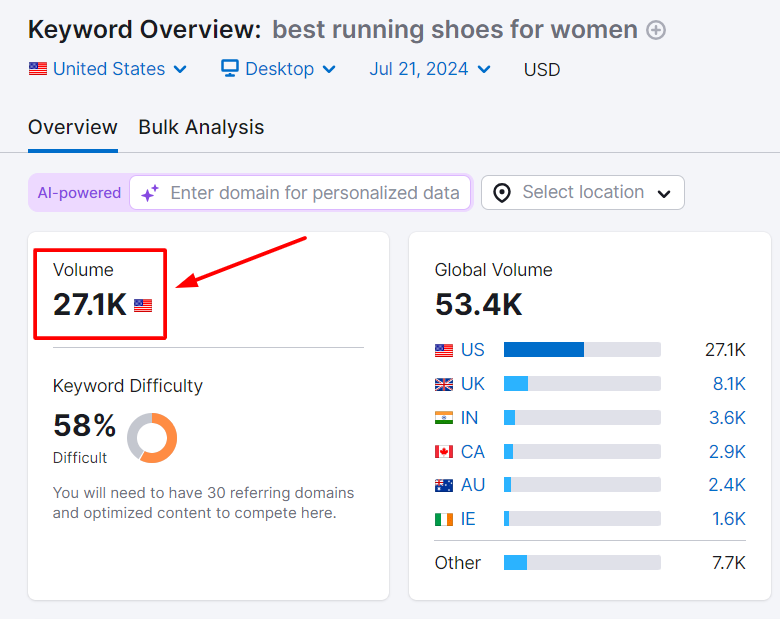
B2B (Lower Search Volume, More Specific): “enterprise resource planning software” (6.6K monthly searches) – Targets businesses looking for a specific B2B solution.
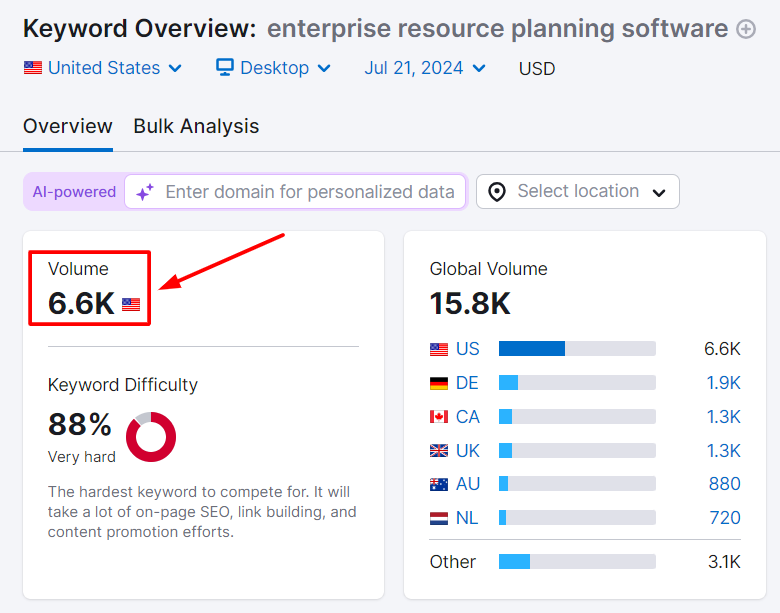
As you can see, B2C keywords tend to have higher search volumes because they target broader consumer interests. B2B keywords have lower volumes due to their focus on specific industries and business needs. So for B2B SEOs, we really need to nail their keyword research.
- Lower Conversion Rates: B2B conversion rates tend to be lower than B2C due to the longer sales cycle and higher purchase value. B2B SEO focuses on nurturing leads with valuable content to increase the chance of conversion at the end of the sales funnel. On the other hand in B2C conversion rates can be higher as purchases are often more immediate.
- Content for Decision Makers: Content needs to be informative, educational, and establish your company as an industry thought leader. White papers, case studies, and in-depth blog posts are valuable formats for B2B content. On the other hand for B2C, content can be more diverse, including product descriptions, blog posts with buying guides, and engaging social media content. Visuals are often more important for B2C content.
Understanding these differences is crucial for developing an effective B2B SEO strategy.
Crafting a Winning B2B SEO Strategy: A Step-by-Step Guide
Now that you understand the importance of B2B SEO, let’s dive into a step-by-step guide for creating a strategy that delivers results.
1. Determine Your Audience: Know Who You're Targeting
- Industry: Who are the specific businesses you want to reach? Are they in manufacturing, healthcare, or IT?
- Company Size: Are you targeting small businesses, large enterprises, or both?
- Decision-Makers: Who are the key individuals involved in the buying process? Marketing managers, CEOs, or technical specialists?
- Needs and Challenges: What are the pain points and challenges faced by your target audience? What are they searching for online?
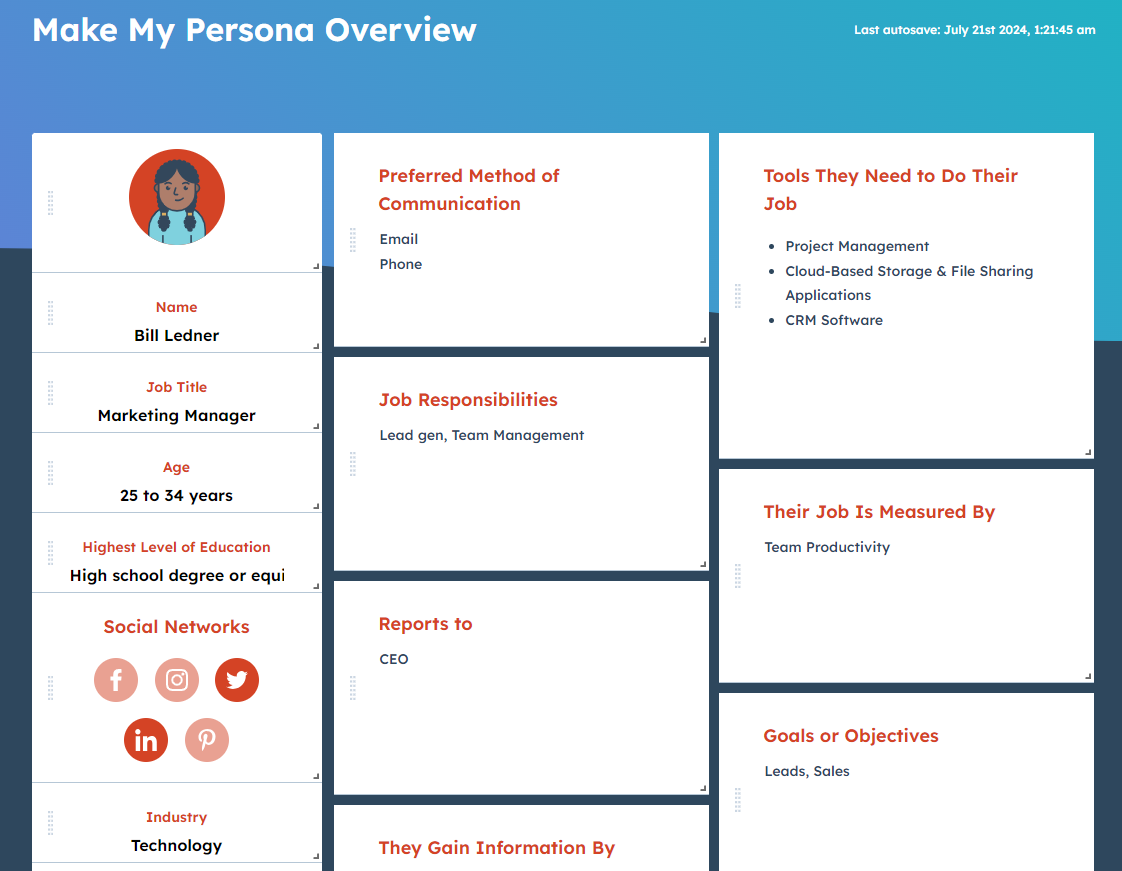
2. Understand Your Sales Funnel
Your sales funnel is the roadmap that prospects take from initial awareness of your brand to becoming a paying customer. B2B sales funnels tend to be more complex than B2C due to longer decision-making processes and multiple stakeholders involved.
Here’s a simplified B2B sales funnel breakdown:
- Awareness: The potential customer becomes aware of your company or the problem you solve through content marketing, social media, or industry events.
- Consideration: The prospect researches potential solutions, including your company, by downloading white papers, reading blog posts, and comparing features.
- Decision: The decision-makers evaluate different solutions and choose the one that best addresses their needs.
- Retention: After the sale, you focus on building a long-term relationship with the customer through ongoing support and service.
Understanding your B2B sales funnel enables you to optimize your content for each stage.
Note: You should monitor average customer retention and their average time to purchase. Communicate with your sales team to understand why customers leave. Dive deep into sales and marketing data to uncover insights, and use Google Analytics to track the customer journey.
3. Research Relevant Keywords
B2B buyers generally use specific, long-tail keywords that precisely describe their needs. For example, instead of a broad keyword like “resource planning,” a B2B buyer might search for “enterprise resource planning software.”
Here are some strategies for identifying relevant B2B keywords:
- Utilize keyword research tools: Tools like Google Keyword Planner or Semrush can help you uncover high-volume, low-competition keywords that your target audience is searching for.
- Analyze competitor websites: See what keywords your competitors are ranking for and consider targeting similar terms or identifying gaps in their keyword strategy.
- Industry forums and communities: Participate in online communities relevant to your industry. Here, you can gain valuable insights into the language and specific terminology your target audience uses to describe their challenges.
For Example: if you use “enterprise resource planning software” for your keyword research.
- Semrush
Semrush can provide you with various keyword variations.
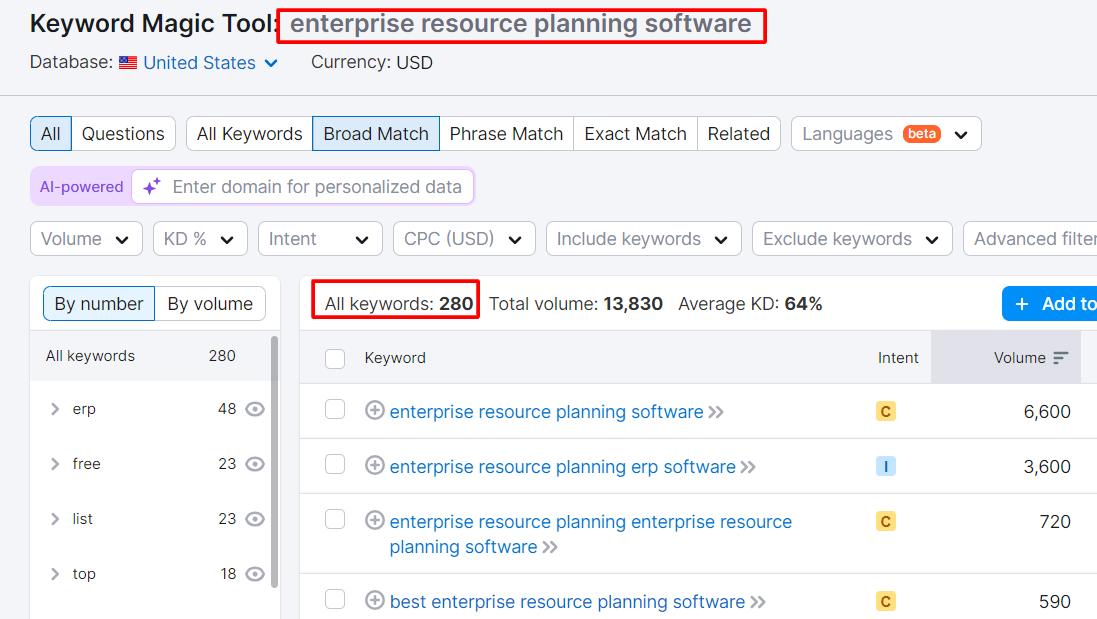
You can also select keywords based on intent, as shown in the below screenshot.
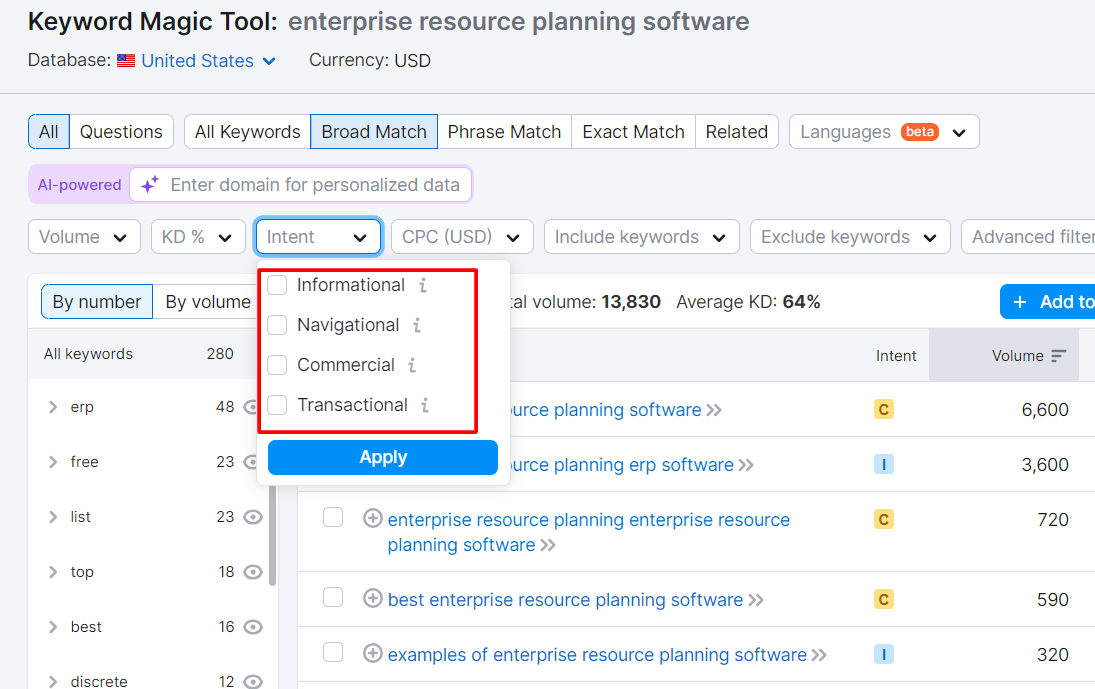
If you’re looking for keywords to target blogs, click on “Questions” to find informational intent keywords.
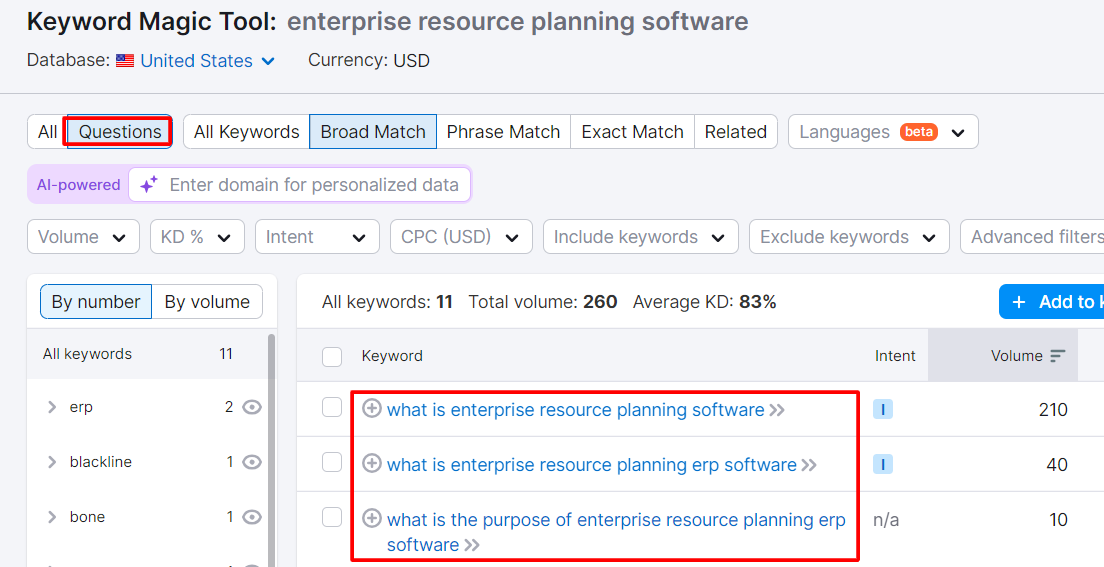
- Google Keyword Planner
Visit Google Ads. Here, you can find plenty of keywords to choose from. Consider using a combination of long-tail keywords and those with low difficulty.
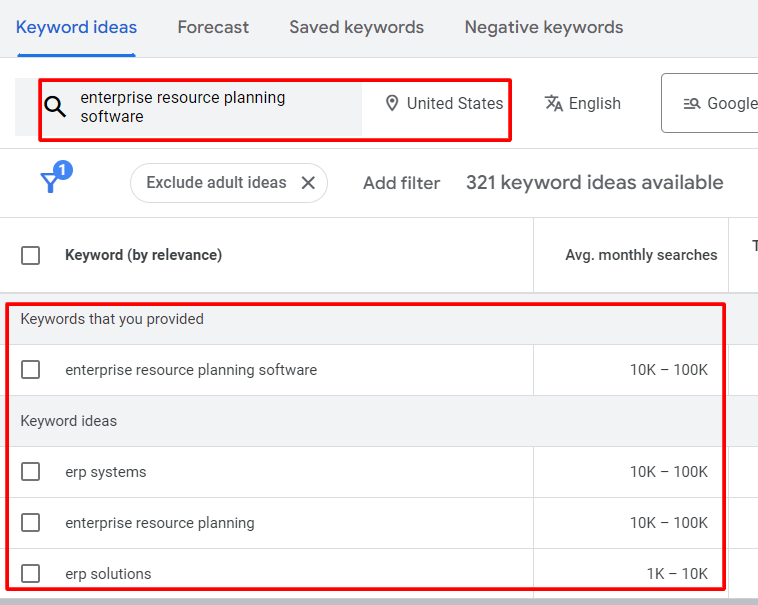
4. Develop a Content Strategy That Converts
Now that you understand your audience, sales funnel, and keywords, it’s time to create a compelling content strategy. B2B content needs to be informative, educational, and establish your company as a thought leader in your industry. Here are some content formats that work well for B2B SEO:
- White Papers: These in-depth reports address complex industry topics, showcasing your expertise and providing valuable insights to potential customers.
- Case Studies: Showcase successful client stories highlighting how your solutions helped them achieve specific goals. This builds trust and demonstrates the value you can offer.
- Blog Posts: Regularly publishing informative blog posts around relevant industry trends and topics positions you as a thought leader and keeps your content fresh for search engines.
- Industry Reports: Research and publish reports on industry trends or challenges, providing valuable data and insights that potential customers will find helpful.
- Webinars & Online Events: Hosting webinars on relevant topics allows you to engage with your target audience in real-time, answer their questions, and showcase your expertise.
- Podcasts: Create a more personal connection with your audience by using podcasts to connect on a deeper level.
So, how do you find the questions and topics people are searching for? First, you can check out case studies, blogs, or podcasts that your competitors publish and analyze the traffic they get using tools like Semrush and Ahrefs.
Secondly, you can directly discover topics and queries people are searching for using various tools. For instance, in Semrush, you can conduct topic research by entering a keyword, as shown in the screenshot below.
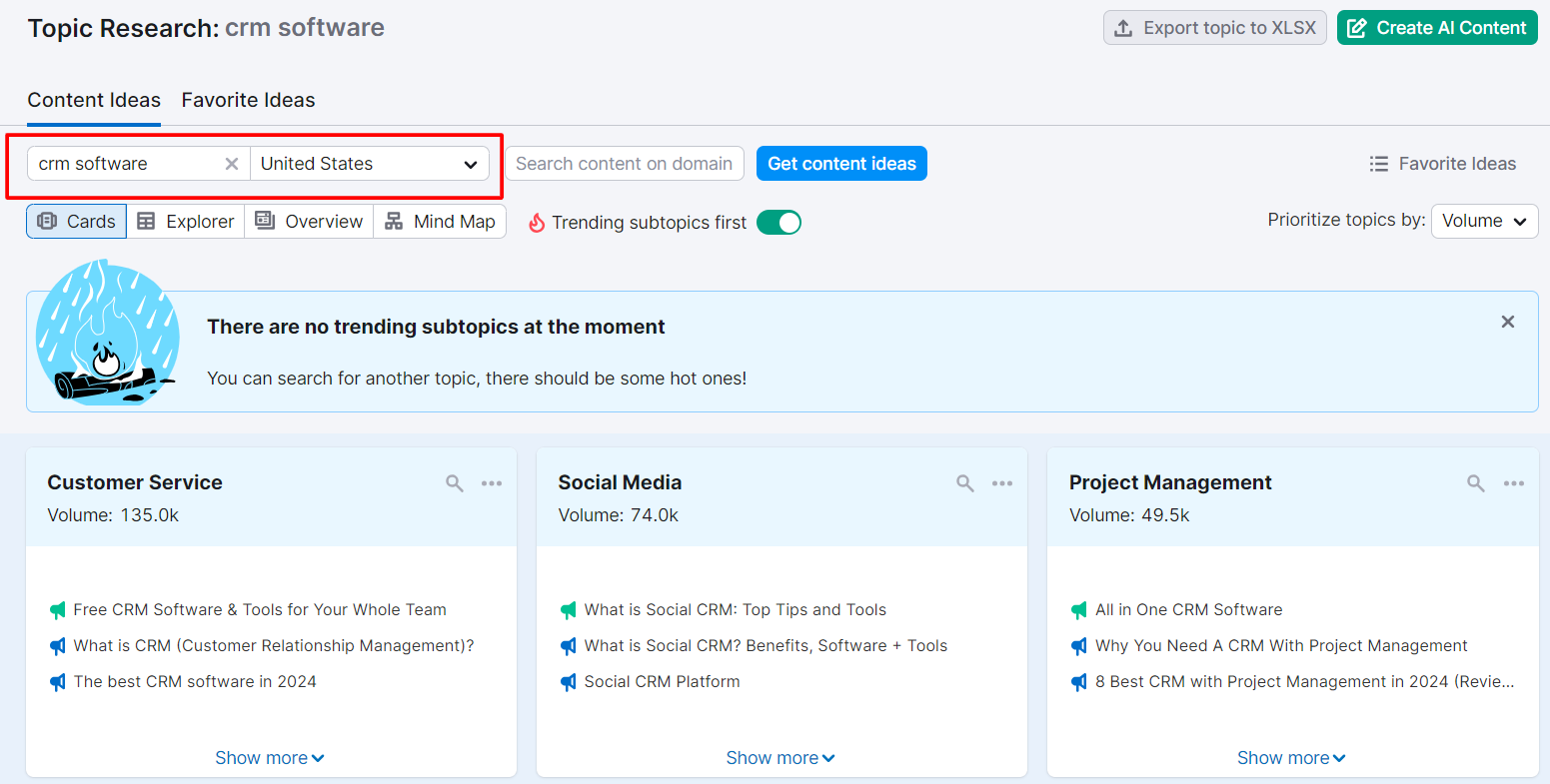
Additionally, as mentioned earlier, you can find different queries and create content around them.
5. Building a Solid Foundation: Technical & On-Page SEO Optimization
While compelling content attracts visitors, a user-friendly website experience keeps them engaged. Technical SEO and on-page optimization ensure your website is search engine friendly and provides a seamless browsing experience. Here’s what to focus on:
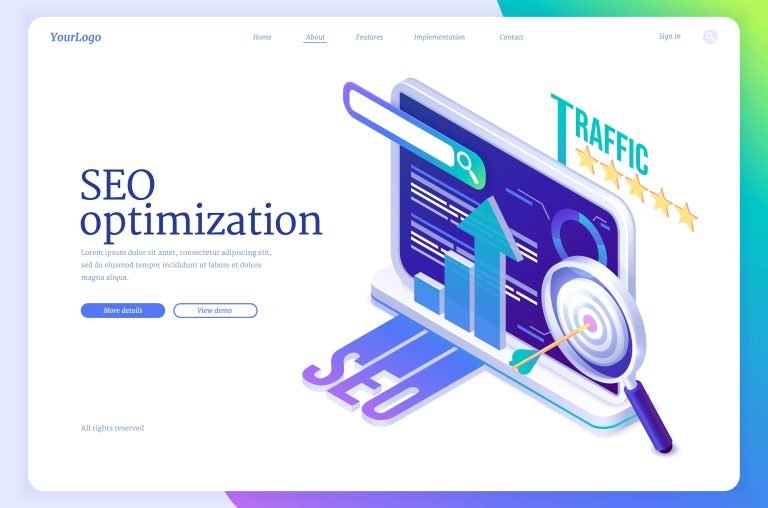
- Mobile Optimization: With the rise of mobile browsing, a mobile-responsive website design is no longer optional, it’s essential. Ensure your website displays and functions flawlessly across all devices.
- Technical Audit: Conduct a technical SEO audit to identify website issues like broken links, slow loading times, and website structure problems. Fix these issues to improve website crawlability and user experience.
- Fast Loading Speeds: Nobody wants to wait for a website to load. Optimize your website for speed by optimizing images, using a Content Delivery Network (CDN), and minimizing code bloat.
- Keyword Optimization: Integrate your targeted long-tail keywords strategically throughout your website. Include them in page titles, meta descriptions, header tags, and naturally within the content itself.
- Internal Linking: Create a strong internal linking structure to connect relevant pages on your website. This helps search engines understand your website’s content hierarchy and improve website navigation for users.
By prioritizing technical and on-page SEO, you ensure that search engines can easily crawl and index your website, ultimately increasing your chances of ranking higher in search results.
6. Promote Your Content: Amplifying Your Voice
Creating high-quality content is paramount for a successful B2B SEO strategy. However, simply publishing content is not enough. To maximize its impact, you need a robust content promotion strategy that ensures your valuable content reaches the right audience

Here are some effective B2B content promotion strategies:
- Link Building: Building backlinks from high-authority websites in your industry remains a cornerstone of B2B SEO. Guest blogging, creating industry resources that other websites will find valuable, and engaging in social media outreach are all effective ways to earn backlinks.
- Social Media Marketing: Leverage the power of social media platforms like LinkedIn and Twitter to share your B2B content with relevant industry professionals and communities. Utilize relevant hashtags, participate in industry discussions, and engage with potential customers to increase brand awareness and drive traffic back to your website.
- Email Marketing: Email marketing remains a powerful tool for nurturing leads generated through your B2B SEO efforts. Create targeted email campaigns that promote your content, showcase your expertise, and guide leads further down the sales funnel.
Get Started on Your B2B SEO Strategy with Ranking Mantra
Building a successful B2B SEO strategy requires planning and ongoing effort, but the rewards are significant. While this blog post provides a foundational understanding, consider partnering with a digital marketing agency specializing in B2B SEO. Ranking Mantra, for example, can help you develop and implement a customized B2B SEO plan that yields tangible results.
By prioritizing B2B SEO and tailoring your strategy to the unique needs of your business audience, you can attract qualified leads, generate sales, and establish yourself as a leader in your industry.
FAQs
SEO is essential for B2B companies because it attracts qualified leads who are actively searching for solutions in your industry. It helps build brand awareness and establish your company as a trusted resource, leading to more leads and sales.
Absolutely! Social media platforms allow you to share your valuable B2B content, increasing website traffic and brand awareness. Social media can also help you earn backlinks from industry publications, which boosts your SEO ranking.
B2B SEO is a marathon, not a sprint. While you might see some initial improvements in a few months, significant results in traffic and leads can take 6-12 months or more. Consistency and patience are key!
Focusing on generic keywords that won’t attract qualified leads is a big one. Additionally, neglecting mobile optimization and creating thin content with little value can hinder your B2B SEO efforts.
Several free and affordable tools can help you with B2B SEO. Google Keyword Planner helps with keyword research, while Google Search Console offers website analysis. There are also free SEO audit tools available from some providers.
SaaS SEO (Software-as-a-Service SEO) is a specific B2B SEO strategy focused on optimizing websites and online presence for SaaS (Subscription-as-a-Service) companies. It involves targeting relevant keywords used by potential customers searching for software solutions.
The 7 P’s of B2B marketing can refer to various elements, but some common ones include: Product, Price, Place (Distribution), Promotion, People, Process, and Physical Evidence.
Similar to the 7 P’s, the 4 C’s of B2B marketing can vary. Some potential components include: Customer, Cost, Communication, and Convenience.
While SEO expertise can be valuable, it’s not always necessary. You can learn and implement basic B2B SEO practices yourself. However, for a comprehensive strategy and advanced tactics, hiring an SEO specialist can be very beneficial.





